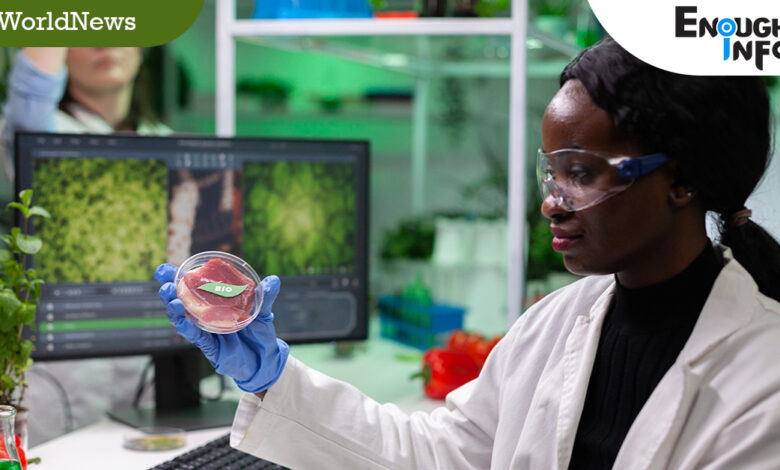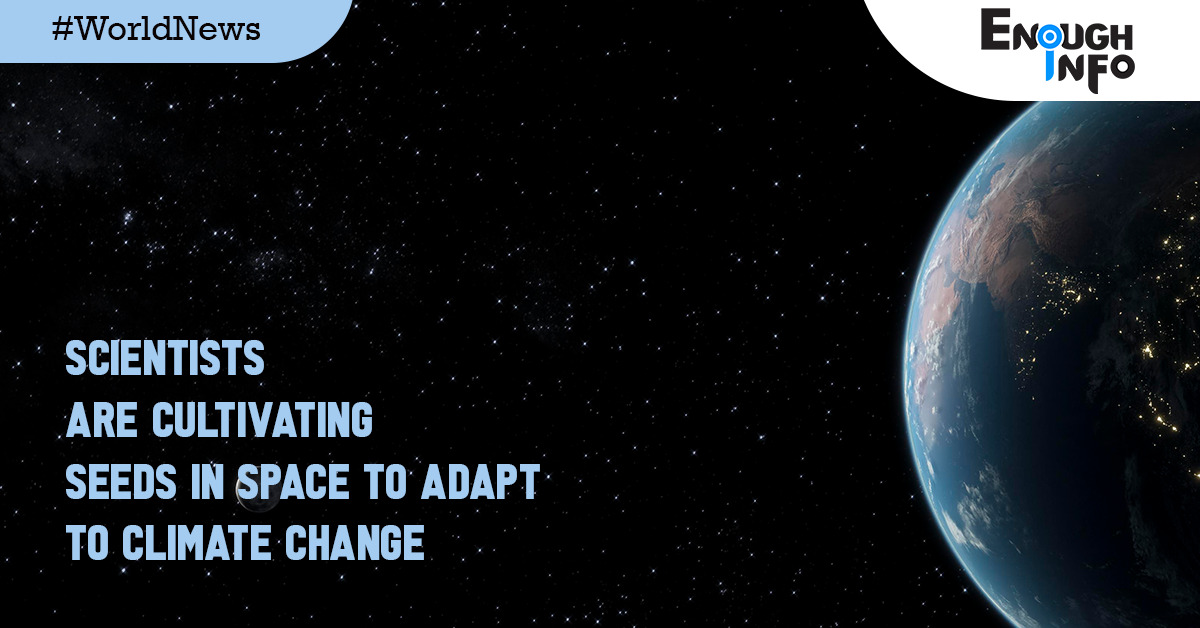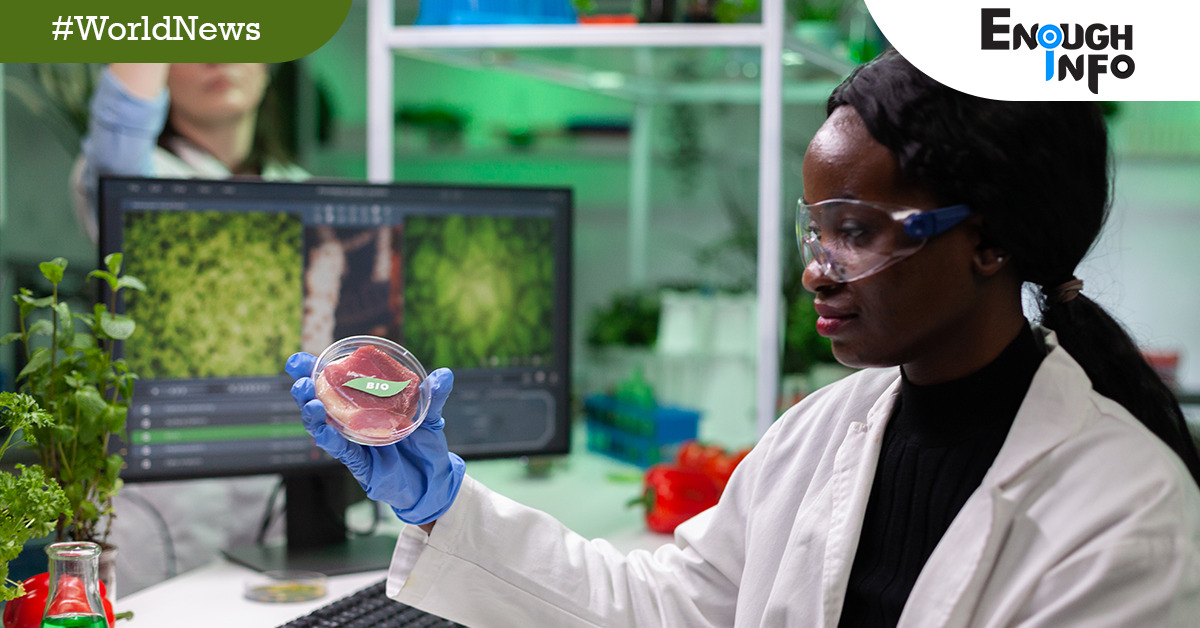Scientists Are Cultivating Seeds In Space To Adapt To Climate Change
Scientists Are Cultivating Seeds In Space

Scientists Are Cultivating Seeds In Space To Adapt To Climate Change: Scientists have taken on an innovative and forward-thinking mission to help humanity adapt to the difficulties that lie ahead: growing seeds in space. This is in response to the mounting effects of climate change and its devastating effects on our planet. EnoughInfo.com
These forward-thinking researchers are utilizing the special environment of space to unearth crucial insights regarding plant growth, resilience, and adaptability as a result of our expanding awareness of the complexities of our changing climate.

Read Also: How To Build A Successful And Fulfilling Career In Today’s World
Importance
First Point
As climate change, unpredictable weather, and environmental issues increase, sustainable solutions are more important than ever. Scientists are studying microgravity, differing air conditions, and less sunlight in space to boost agricultural production and resilience in a changing environment on Earth.
Second Point
NASA’s Veggie Plant Growth System on the ISS is a notable example. This cutting-edge technology uses LED illumination and fertilizer delivery technologies to govern a variety of plant kinds. Astronauts and scientists carefully arrange studies to study how plants adapt to spaceflight’s gravity and supply issues.
Third point
Space-grown plants are produced under unattainable circumstances. Scientists may investigate how plants grow, root, and absorb nutrients without gravity, which has shaped life on Earth for millions of years. These modifications will teach scientists about plant physiology and suggest ways to boost crop resilience on Earth.
Fourth Point
This study goes beyond space travel. By studying how plants adapt to space, scientists want to develop new agricultural methods, breed hardier crops, and find innovative solutions to climate change’s dire consequences. These programs may improve food production, sustainable agriculture, and global food security through climate change.
Fifth Point
The space-grown seeds effort also emphasizes humanity’s interconnectedness and the importance of collaboration in solving global issues. Many professions, space agencies, and research groups collaborate to study plant adaptability in space. They collaborate across borders to tackle climate change and create a sustainable future for future generations.
Read Also: BRICS: A New Currency (All You Need To Know)
Space Seeds
The UN’s Food and Agriculture Organization (FAO) and the International Atomic Energy Agency (IAEA) collaborated to send seeds to the International Space Station (ISS) in 2022. The goal is to cause genetic abnormalities in the seeds by subjecting them to cosmic radiation and microgravity, which may aid in the development of hardy crops that may thrive in the face of the worsening climate catastrophe. How To Clean Silverware (Guide To Shining Brilliance)

Sorghum and Arabidopsis seeds spent many months aboard the International Space Station before being brought down to Earth in April for study. The screening process to find advantageous features in the altered seeds will now start.
Gamma rays and X-rays may be used to intentionally cause plant mutations on Earth, according to Shoba Sivasankar, director of plant breeding and genetics at the joint FAO and IAEA Center of Nuclear Techniques in Food and Agriculture.
However, the space environment, which features a wider spectrum of radiation as well as additional extremes like microgravity and temperature variations, has the potential to cause genetic changes that are different from or are induced much faster than those typically seen using terrestrial radiation sources.
According to Sivasankar, “the stress that an organism will experience in space will be at the highest level and beyond anything that we can actually simulate on Earth.” She continues by stating that the radiation outside of the ISS may be “more than a hundredfold higher” than what is typically seen on Earth. How To Make A DIY Face Mask For Dry Skin
Sivasankar and her team want to develop new crop strains by selectively breeding plants developed from the altered seeds.
First and foremost, she explains, “we are aiming to improve crop yields and productivity of crops like cereals, legumes, roots and tubers, including cassava and sweet potato. There is also climate change resilience, which includes resistance to rising disease rates, tolerance of climate phenomena like drought or extreme heat, and rising soil salinity due to saltwater intrusion, irrigation, and evaporation.
A Global Initiative
Scientists have been launching seeds into space for many years. Since the 1980s, China has used satellites and high-altitude balloons to expose seeds to cosmic radiation in order to cause genetic mutation in crops. This practice is said to have enabled the development of enormous sweet peppers as well as advancements in wheat and rice.
The International Space Station has carried a wide variety of seeds, and Michigan State University (MSU) scientists are presently testing the growth of seeds that were launched around the moon as part of NASA’s Artemis mission. How To Start A Successful Online Course
The MSU researchers are examining how extraterrestrial environments affect plant amino acids, which serve as the building blocks of proteins, and how that affects plant growth and development. The study may provide light on how plants may adapt to harsh settings and shed light on the possibility of cultivating crops in space for extended periods of time.
The effect of spaceflight on plant seeds has attracted interest from the corporate sector as well. StarLab Oasis, an Abu Dhabi-based start-up, has revealed intentions to launch quinoa seeds into space in the United Arab Emirates in an effort to improve the genetic potential of a plant that has potential due to its nutritional value and resilience in dry environments. How To Crate Train A Puppy(The Ultimate Guide)
Allen Herbert, the co-founder of StarLab Oasis, told CNN in 2022 that sending seeds to space will assist with “sustainability, climate change, and food security on Earth.” “In space, you have a finite amount of space, energy, and other resources. It’s the ideal location for study, and the same technology can be quickly returned to Earth.
The IAEA predicts that preliminary findings from its research might be made public later this year. Sivasankar is motivated by the same desire to discover answers for Earthbound agriculture.
I do feel optimistic about the future of food security, she continues, because technology is becoming more prominent. “However, food security is not just about genetics — we need a combination of all technologies, and everyone needs to come together and work together,” the speaker said.
To Sum it all up
The growing of seeds in space is an ambitious project to explore new territory and reveal the mysteries of nature as the globe struggles with the effects of climate change. It is a perfect example of the persistent spirit of science inquiry, pushing the limits of our knowledge and utilizing the untapped power of space to address the urgent issues on Earth. Scientists work to pave the way for resilience, sustainability, and adaptation through these innovative projects, providing hope for a better future in the face of a constantly changing environment.




